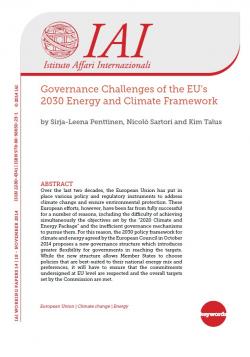Governance Challenges of the EU's 2030 Energy and Climate Framework
Over the last two decades, the European Union has put in place various policy and regulatory instruments to address climate change and ensure environmental protection. These European efforts, however, have been far from fully successful for a number of reasons, including the difficulty of achieving simultaneously the objectives set by the "2020 Climate and Energy Package" and the inefficient governance mechanisms to pursue them. For this reason, the 2030 policy framework for climate and energy agreed by the European Council in October 2014 proposes a new governance structure which introduces greater flexibility for governments in reaching the targets. While the new structure allows Member States to choose policies that are best-suited to their national energy mix and preferences, it will have to ensure that the commitments undersigned at EU level are respected and the overall targets set by the Commission are met.
Paper produced within the framework of the IAI-Edison project "The Future of the European Energy Policy: The Italian Contribution".
-
Details
Roma, Istituto affari internazionali, November 2014, 17 p. -
Issue
14|18 -
ISBN/ISSN/DOI:
978-88-98650-23-1
Introduction
1. The 20-20-20 targets and the 2020 climate and energy package
1.1 Greenhouse gas emissions reduction
1.2 Promotion of renewables
1.3 Energy efficiency
2. Shortcomings of the 2020 package
3. The new 2030 framework: which governance mechanisms?
3.1 European governance for the 2030 framework
Conclusions and policy recommendations
Topic
Tag
Related content
-
Event14/01/2015
What Models for European Energy Governance?
leggi tutto -
Ricerca04/01/2015
The future of the European energy policy: the Italian contribution
leggi tutto



